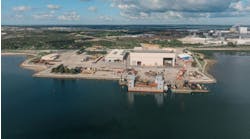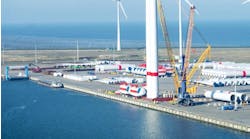Resource nationalism in Latin America threatens investment opportunities
The Western Hemisphere represents approximately one-third of the world's proven conventional and unconventional oil and natural gas reserves; Venezuela alone has approximately 300 Bbbl of proven conventional and unconventional oil reserves.
The United States Geological Survey's 2012 "Assessment of Undiscovered Conventional Oil and Gas Resources of South America and the Caribbean" estimates that there is an additional 126 Bbbl of oil and 679 tcf (19 tcm) of undiscovered natural gas in South America and the Caribbean's 31 geologic provinces, including 55 Bbbl in deepwater Brazil and approximately 14 Bbbl in the Guyana-Suriname offshore basins.
Most recently, a study from the EIA also showed that Argentina and Mexico are the third- and fourth-largest holders, respectively, of technically recoverable shale gas reserves in the world. According to this study, nearly 50% of the world's total shale gas reserves are in the Western Hemisphere.
Even though the Western Hemisphere's proven natural gas reserves only represent approximately 10% of the world's total reserves, they play an important role in the region's energy balance.
With 305 tcf (8.6 tcm) of proven natural gas reserves, the US is the largest regional holder of natural gas reserves, followed by Venezuela, with 176 tcf (5 tcm) of proven natural gas reserves. Canada, Mexico, Bolivia, Argentina, Peru, Trinidad and Tobago, and Brazil are also important holders of natural gas reserves.
Today, Latin America's energy potential is being undermined by a number of serious geopolitical uncertainties, along with economic, environmental, social, and regulatory issues that could impact the monetization of the region's rich hydrocarbon resources.
High political risk, onerous fiscal and contractual terms and conditions, populist political rhetoric, and the nationalization of foreign oil companies' assets have caused a decline in exploration and production investment in Venezuela, Ecuador, Bolivia, Argentina, and Mexico. The nationalization of privately held oil and natural gas assets by a number of governments, such as Venezuela's 2007 appropriation of Conoco and ExxonMobil assets and Ecuador's 2006 expropriation of Occidental Petroleum assets, underlines the reality of "resource nationalism" in Latin America and its potential impact on future development of the region's hydrocarbon resources.
Last year, Argentina finalized the confiscation without compensation of shares in YPF, owned by the Spanish oil company Repsol, giving the country a 51% controlling stake in the company and reinforcing the challenge of resource nationalism in the region. If Argentina, a member of the G20, can carry on these policies without having to face the consequences, the rule of law could be seriously undermined, creating a domino effect in other Latin American countries and further deteriorating much-needed investment confidence the region.
The legal dispute by the government of Ecuador against Chevron for the alleged ecological damage caused by Texaco and its partner PetroEcuador at the Lago Agrio oil field in the 1970s also raises questions about the seriousness of some governments in their long-term commitment to sustainable development of their natural resources.
Latin America faces huge technological challenges in both upstream and downstream resource development and environmental stewardship, along with governance and social responsibility issues related to the management of oil and natural gas resource development. The development, production, and commercialization of conventional, unconventional, and renewable energy resources is highly capital intensive and requires a high rate of technological evolution.
If countries in Latin America want to increase energy and resource development activities, they must offer fiscal and contractual terms and conditions that grant an acceptable rate of return to investors commensurate with the potential and associated technical, commercial, and political risks.
In addition to increasing revenues to support social and educational programs, the objectives of the fiscal and regulatory policies of host governments should include:
- Attracting foreign investment
- Technology transfer
- Infrastructure development and job creation.
The industry should encourage the design of fiscal and investment models that create alignment between the objectives of host governments and foreign investors, and should promote good governance standards and behaviors such as:
- Rule of law, including incorruptible law enforcement agencies and an independent judiciary
- Division of responsibility between the supervisory, regulatory, and enforcement authorities
- Accountability, where public and private institutions can show the extent to which their actions and decisions are consistent with clearly-defined and agreed-upon objectives
- Transparency, where government actions, decisions and decision-making processes are open to an appropriate level of scrutiny by others parts of government and civil society
- Integrity, essential for building strong, socially responsible public and private institutions that resist corruption.
In order to take advantage of the vast energy investment opportunities in the region, the US, and the international community at large, must strengthen the credibility of investment protection principles and instruments, along with continuity and stability in fiscal and political policies that would offer the long-term guarantees and security investors require.
Jorge Piñon
Interim Director, Center for International Energy and Environmental Policy, The University of Texas at Austin
This page reflects viewpoints on the political, economic, cultural, technological, and environmental issues that shape the future of the petroleum industry. Offshore Magazine invites you to share your thoughts. Email your Beyond the Horizon manuscript to David Paganie at[email protected].


